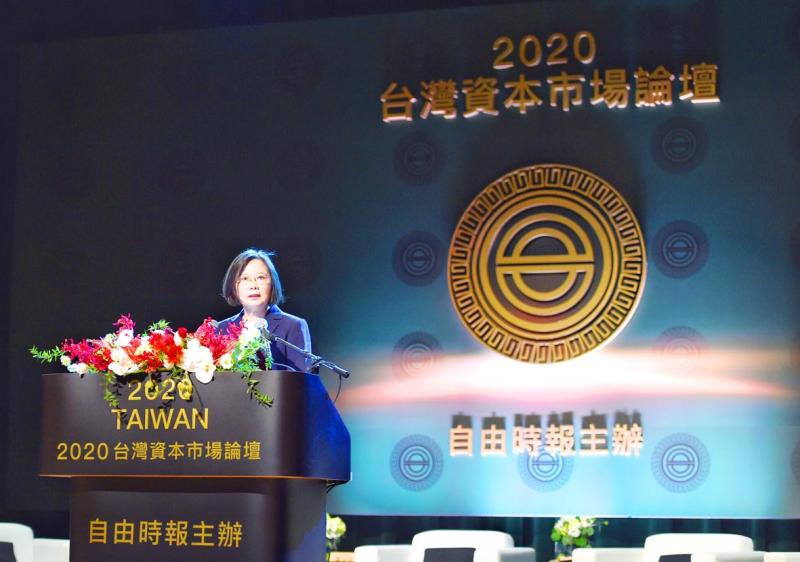Taiwan would liberalize banking and investment rules to establish itself as a regional financial hub, President Tsai Ing-wen (蔡英文) told the Taiwan Capital Market Forum in Taipei yesterday.
Recent world events could be an opening for Taiwan to become an international center for business investments and financial management, Tsai said at the forum, which was organized by the Chinese-language Liberty Times (the sister publication of the Taipei Times).
“We’re facing unknowns in the world right now, including the continuing impact of US-China trade tensions and the reorganization of the global supply chain after COVID-19,” Tsai said. “These bring new challenges and opportunities.”

Photo: Liu Hsin-de, Taipei Times
Tsai said that Taiwan has two major advantages.
“First, our transparent laws and efficient courts are appealing to international businesses. Second, our comprehensive financial institutions,” she said.
In addition, dividend yields are high in Taiwan, transactions are stable and transparent, and compared with surrounding countries, the liquidity of Taiwan’s capital markets is high, Tsai said.
The ratio of foreign investors holding Taiwanese equities is at a historic high, at 41.2 percent as of the end of last year, Tsai said.
There are 1,717 publicly traded companies in Taiwan with a combined value NT$39.84 trillion (US$1.35 trillion), up 106 percent and 331 percent respectively from 2000, she said.
“While the world’s stock markets are all affected by COVID-19, Taiwan’s market hit a 30-year high. It is clear to see we are increasingly favored by foreign investors,” she said.
However, market liberalization would be the key to attract banks and other investment institutions to set up shop in Taiwan amid a government goal to make the nation Asia’s top destination for business financing, Tsai said.
“We are going to make Taiwan the No. 1 center in Asia for capital movement. In the future, we are going to relax rules for international finance institutions to establish offshore banking units [OBU] in Taiwan and make it more convenient to use foreign currencies. With more OBUs in Taiwan, we will be able to strengthen manufacturing development with all that capital,” she said.
“Secondly, we also wish to establish ourselves as a wealth management center,” Tsai said. “This means loosening rules and providing more diversified financial products and services. We can expand the scale of wealth management businesses, and attract more international institutions and capital to Taiwan.”
Tsai said that some businesses have been unable to go public as planned due to profit being hit by the COVID-19 pandemic.
“We’re working with those businesses proactively, loosening requirements and helping them obtain loans to get back on their feet,” she said.
Premier Su Tseng-chang (蘇貞昌) told the forum that Taiwan has taken advantage of the US-China trade dispute by encouraging investment.
“There has been more than NT$1 trillion in investment in Taiwan since last year’s rise in US-China trade tensions,” Su said. “According to last month’s international assessments, Taiwan is the safest investment environment in Asia, and third in the world, after Switzerland and Norway."

Right-wing political scientist Laura Fernandez on Sunday won Costa Rica’s presidential election by a landslide, after promising to crack down on rising violence linked to the cocaine trade. Fernandez’s nearest rival, economist Alvaro Ramos, conceded defeat as results showed the ruling party far exceeding the threshold of 40 percent needed to avoid a runoff. With 94 percent of polling stations counted, the political heir of outgoing Costa Rican President Rodrigo Chaves had captured 48.3 percent of the vote compared with Ramos’ 33.4 percent, the Supreme Electoral Tribunal said. As soon as the first results were announced, members of Fernandez’s Sovereign People’s Party

MORE RESPONSIBILITY: Draftees would be expected to fight alongside professional soldiers, likely requiring the transformation of some training brigades into combat units The armed forces are to start incorporating new conscripts into combined arms brigades this year to enhance combat readiness, the Executive Yuan’s latest policy report said. The new policy would affect Taiwanese men entering the military for their compulsory service, which was extended to one year under reforms by then-president Tsai Ing-wen (蔡英文) in 2022. The conscripts would be trained to operate machine guns, uncrewed aerial vehicles, anti-tank guided missile launchers and Stinger air defense systems, the report said, adding that the basic training would be lengthened to eight weeks. After basic training, conscripts would be sorted into infantry battalions that would take

GROWING AMBITIONS: The scale and tempo of the operations show that the Strait has become the core theater for China to expand its security interests, the report said Chinese military aircraft incursions around Taiwan have surged nearly 15-fold over the past five years, according to a report released yesterday by the Democratic Progressive Party’s (DPP) Department of China Affairs. Sorties in the Taiwan Strait were previously irregular, totaling 380 in 2020, but have since evolved into routine operations, the report showed. “This demonstrates that the Taiwan Strait has become both the starting point and testing ground for Beijing’s expansionist ambitions,” it said. Driven by military expansionism, China is systematically pursuing actions aimed at altering the regional “status quo,” the department said, adding that Taiwan represents the most critical link in China’s

‘REALLY PROUD’: Nvidia would not be possible without Taiwan, Huang said, adding that TSMC would be increasing its capacity by 100 percent Nvidia Corp CEO Jensen Huang (黃仁勳) on Saturday praised and lightly cajoled his major Taiwanese suppliers to produce more to help power strong demand for artificial intelligence (AI), capping a visit to the country of his birth, where he has been mobbed by adoring fans at every step. Speaking at an impromptu press conference in the rain outside a Taipei restaurant, where he had hosted suppliers for a “trillion-dollar dinner,” named after the market capitalization of those firms attending, Huang said this would be another good year for business. “TSMC needs to work very hard this year because I need a lot